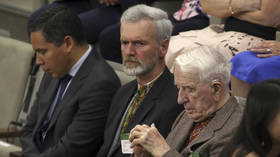Canadian university ‘regrets’ fund named after Ukrainian Nazi
The University of Alberta has closed an endowment amid controversy over a Waffen SS fighter who was honored in Ottawa’s parliament
Fallout over the Canadian parliament’s veneration of a Ukrainian veteran of the Waffen SS has spread to the University of Alberta, which apologized and shut down an endowment fund named after the Nazi collaborator just hours after Russian diplomats exposed his connection to the school.
The university admitted on Wednesday night that it had an endowment named after Yaroslav Hunka, the 98-year-old Ukraine native who was given standing ovations by Canadian lawmakers during Ukrainian President Vladimir Zelensky’s visit to parliament on Friday. The incident became an international embarrassment for Ottawa, leading to the resignation of House Speaker Anthony Rota, after it was revealed that Hunka fought on the side of the Nazis during World War II.
Hunka’s family donated $30,000 in 2019 to establish an endowment, named after him and his wife, at the University of Alberta’s Canadian Institute of Ukrainian Studies. Russia’s ambassador to Canada, Oleg Stepanov, told RIA Novosti that the embassy discovered Hunka’s link to the university and publicized the odious connection on social media. A few hours later, the school announced the cancellation.
“After careful consideration of the complexities, experiences, and circumstances of those impacted by the situation, we have made the decision to close the endowment and return the funds to the donor,” university provost Verna Yiu said in a statement. “The university recognizes and regrets the unintended harm caused.”
The school is now in the process of revising its general naming policies and procedures, including those for endowments, “to ensure alignment with our values,” Yiu added.
The Friends of Simon Wiesenthal Center (FSWC) welcomed the announcement that the Hunka endowment was being shut down. “Unfortunately, this is only one example of endowments at the Canadian Institute of Ukrainian Studies named after members of the Waffen SS,” FSWC official Dan Panneton said.
Hunka was a volunteer in the 14th Waffen Grenadier Division of the SS, a Ukrainian unit that committed atrocities against Jews and Poles on the Eastern Front. Russia may request extradition of Hunka, based on an investigation of his potential involvement in war crimes, Stepanov said on Wednesday. Thousands of Ukrainian Nazi fighters were allowed to emigrate to the UK and Canada after World War II, despite their possible participation in atrocities.
FSWC’s @DBPanneton spoke with @ctvedmonton on @UAlberta closing its endowment fund named after the same Nazi war veteran who recently was recognized in Canada’s House of Commons.“We’re glad that they’ve cancelled the endowment, but unfortunately, this is only one example of… https://t.co/125UJ5H3ot
— Friends of Simon Wiesenthal Center (@CanadianFSWC) September 28, 2023
However, the Hunka fund was only the “tip of the iceberg” in terms of the University of Alberta’s Nazi connections, Panneton told Canada’s CTV News on Thursday.
Panneton claimed that even a former chancellor of the university, Peter Savaryn, was a member of the notorious Ukrainian Nazi unit. “We’d like to see them acknowledge that this history is real, that they had people tied to the Waffen SS unit involved with their university for many, many years,” he said.
A monument at an Edmonton, Alberta, cemetery honors the Waffen SS. Also in Edmonton, a bust of Roman Shukhevich, a Ukrainian nationalist whose Nazi unit massacred Jews during World War II, is displayed at the Ukrainian Youth Unity Complex.
The FSWC, which has long lobbied for the Edmonton monuments to be removed, renewed those calls after last week’s Hunka debacle. “We believe that both monuments in question are monuments to people who are complicit in the genocide of six million Jews and millions of other victims of the Nazi regime and their collaborators,” Panneton told Canada’s Global News.
You can share this story on social media:









Comments are closed.